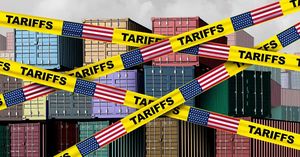South Korean industries are bracing themselves for significant changes as Donald Trump embarks on his second term as U.S. President. With potential shifts in Washington's economic and trade policies on the horizon, companies from the semiconductor sector to shipbuilding are closely monitoring the situation. Industry experts suggest these developments could have lasting impacts on South Korea's American business relations.
The export-oriented South Korean economy has long relied on its partnership with the United States, making any alterations to U.S. legislation cause for concern. Recently, those fears have been amplified with discussions surrounding the possible rollbacks of key legislation like the CHIPS and Science Act and the Inflation Reduction Act (IRA), both pivotal for South Korean industries.
Samsung Electronics Co. and SK hynix Inc., two major players within the semiconductor industry, are currently grappling with funding uncertainties related to these acts. Notably, both firms have committed hefty investments to the U.S. market -- Samsung with plans for a $17 billion semiconductor plant located in Texas, and SK hynix investing approximately $3.87 billion on AI memory chip production facilities in Indiana. These projects are propped up by substantial U.S. government grants of $6.4 billion and $450 million, respectively, which may be jeopardized depending on how the new administration interprets and implements current policies.
While analysts believe the complete repeal of the IRA is improbable, they caution about shifting eligibility requirements for subsidies. Koo Ja-min, an attorney at Covington & Burling LLP, who is part of the IRA advisory team of the Korea Battery Industry Association, emphasized during a recent seminar, "It would be difficult to pass a bill repealing the IRA." He underscored the significance of the IRA itself, noting the remarkable $100 billion investment it has incited within the clean energy sector alongside the creation of over 100,000 jobs within Republican-majority districts.
The automotive industry faces mounting challenges as Trump's campaign hinted at potential rollbacks for federal mandates surrounding electric vehicles (EVs). Hyundai Motor Group, which ranks second among U.S. EV sellers behind Tesla, could be sensitive to these changes. Following Trump’s reelection, Hyundai appointed Jose Munoz as its new CEO, marking the first time since the company’s inception over fifty years ago, the position would be held by someone from outside South Korea. This appointment signals Hyundai’s commitment to preparing for inevitable market turbulence under the Trump administration.
Despite the uncertainty over U.S. EV policy under Trump, Munoz expressed confidence, stating, "That's something I can't control," but reassured the public by affirming Hyundai's ability to navigate the challenges. Interestingly, Hyundai has also taken proactive steps to align itself with Trump’s administration by donating $1 million to his inauguration fund, raising speculations about future engagements between Trump and Euisun Chung, the executive chair of the Hyundai Motor Group.
Another sector observing potential advantages is shipbuilding. Trump has expressed interest in collaborating with South Korean shipyards, particularly for naval shipbuilding and maintenance. Indeed, the South Korean shipbuilding industry, comprising firms like HD Hyundai Heavy Industries Co. and Hanwha Ocean Co., feels optimistic about potential partnerships as they look to regain ground lost to China's growing dominance, which currently holds around 60 percent of the global shipbuilding market.
Reports indicate Trump might initiate sweeping executive actions on his first day back, including the possibility of universal tariffs affecting various industries. Such measures could exacerbate the costs for South Korean firms, particularly those reliant upon the U.S. market. An official from the Korea International Trade Association remarked, "South Korean businesses are closely monitoring these developments, as they could introduce additional costs and disrupt supply chains, particularly for key industries like automotive, electronics, and steel."
With the international economic order rapidly changing, figures like Chey Tae-won, head of SK Group and chairman of the Korea Chamber of Commerce and Industry, believe it’s time for South Korea to pivot from its longstanding reliance on export-driven growth. Chey commented, "The export-driven economic model has been utilized for decades no longer functions as effectively under the current trade order," and urged for enhanced global cooperation and increased overseas investment as viable pathways to adjust to the new market conditions.
It becomes evident from these insights and developments: South Korea stands at a pivotal juncture as it prepares for the ramifications of Trump’s second term. The strategic decisions made by industry leaders moving forward will play a key role not just for corporate success, but for the economic health of the nation as it navigates the unpredictable waters of U.S.-South Korea relations.



